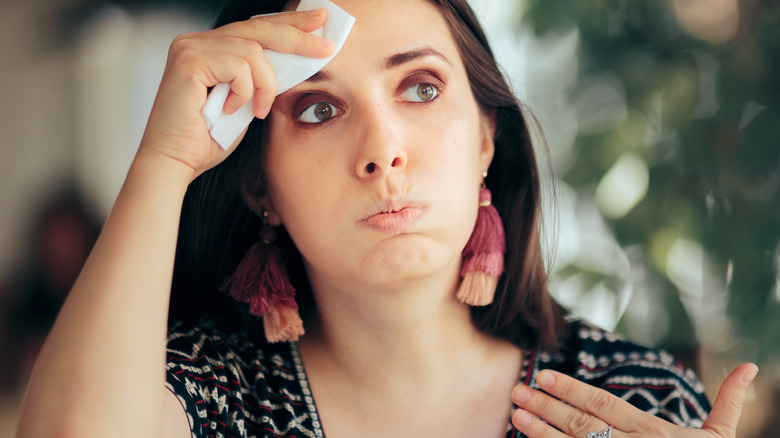Hot flashes after eating can be an uncomfortable and disruptive experience for many individuals, especially women going through menopause. While hot flashes are commonly associated with hormonal changes during menopause, they can also occur after consuming certain foods. Understanding the causes, managing symptoms, and preventing hot flashes after eating is essential for improving overall quality of life.
Understanding Hot Flashes
What are Hot Flashes?
Hot flashes are sudden feelings of warmth, often accompanied by sweating and a flushed face. They can occur at any time of the day or night, but many women experience them more frequently during menopause. However, hot flashes can also occur due to other factors, including food triggers.
Causes of Hot Flashes
Hot flashes are primarily caused by hormonal fluctuations, particularly a decrease in estrogen levels during menopause. Other factors such as stress, anxiety, and certain medications can also trigger hot flashes. Additionally, food and beverages can play a significant role in the onset of hot flashes in some individuals.
Hot Flashes and Diet
Impact of Food on Hot Flashes
Diet can influence hormonal balance and body temperature regulation, making certain foods more likely to trigger hot flashes. Spicy foods, caffeine, alcohol, and hot beverages are common culprits known to exacerbate hot flashes in many individuals. Understanding how dietary choices can affect hot flashes is crucial for managing symptoms effectively.
Foods that Trigger Hot Flashes
Spicy foods containing capsaicin, such as chili peppers and curry dishes, can stimulate the body and increase blood flow, leading to hot flashes in susceptible individuals. Similarly, caffeinated beverages like coffee and tea can trigger hot flashes due to their stimulant effects on the nervous system. Alcohol consumption can also dilate blood vessels and raise body temperature, worsening hot flashes.
Managing Hot Flashes After Eating
Dietary Changes and Tips
Making dietary modifications can help reduce the frequency and severity of hot flashes after eating. Avoiding spicy foods, caffeine, and alcohol can minimize triggers. Instead, opt for a balanced diet rich in fruits, vegetables, whole grains, and lean proteins to support hormonal balance and overall health.
Lifestyle Modifications
In addition to dietary changes, certain lifestyle modifications can also alleviate hot flashes. Engaging in regular exercise, practicing relaxation techniques such as deep breathing or meditation, and maintaining a healthy weight can help manage symptoms effectively.
Seeking Professional Help
When to Consult a Doctor
While hot flashes are often a normal part of menopause, persistent or severe symptoms may warrant medical attention. If hot flashes significantly interfere with daily life or occur alongside other concerning symptoms, it’s essential to consult a healthcare provider for proper evaluation and management.
Treatment Options
Depending on the severity of hot flashes, healthcare providers may recommend hormone therapy, antidepressants, or other medications to alleviate symptoms. Lifestyle modifications and natural remedies can also complement medical treatment in managing hot flashes effectively.
Natural Remedies for Hot Flashes
Herbal Supplements
Certain herbal supplements, such as black cohosh and evening primrose oil, have been studied for their potential benefits in reducing hot flashes. However, it’s essential to consult with a healthcare professional before incorporating herbal remedies into your routine, as they may interact with medications or have side effects.
Acupuncture and Yoga
Alternative therapies like acupuncture and yoga have shown promise in relieving hot flashes and improving overall well-being. These practices focus on restoring balance to the body’s energy pathways and promoting relaxation, which can help alleviate symptoms of hot flashes and stress.
Prevention Techniques
Avoiding Triggers
Identifying and avoiding triggers is key to preventing hot flashes after eating. Keep a food diary to track potential triggers and eliminate or reduce consumption of foods that exacerbate symptoms. Experiment with dietary changes and observe how they impact the frequency and severity of hot flashes.
Stress Management
Stress can exacerbate hot flashes and disrupt hormonal balance. Incorporating stress-reduction techniques such as mindfulness, yoga, or tai chi into your daily routine can help minimize the impact of stress on hot flashes and improve overall well-being.
Conclusion
Hot flashes after eating can be distressing, but understanding their causes and triggers can empower individuals to manage symptoms effectively. By making dietary modifications, adopting healthy lifestyle habits, and seeking appropriate medical care when needed, it’s possible to minimize the impact of hot flashes on daily life and improve overall quality of life.


